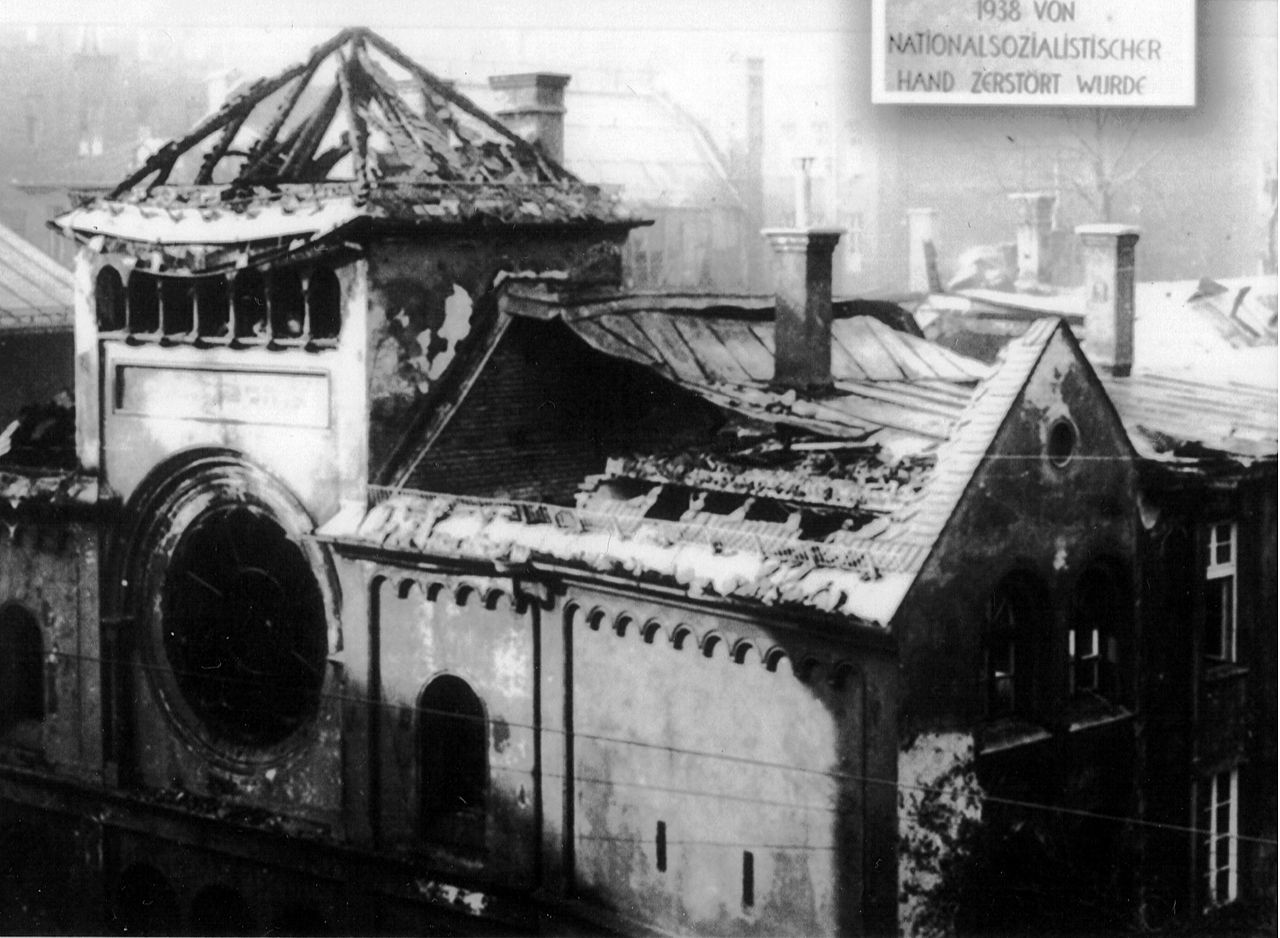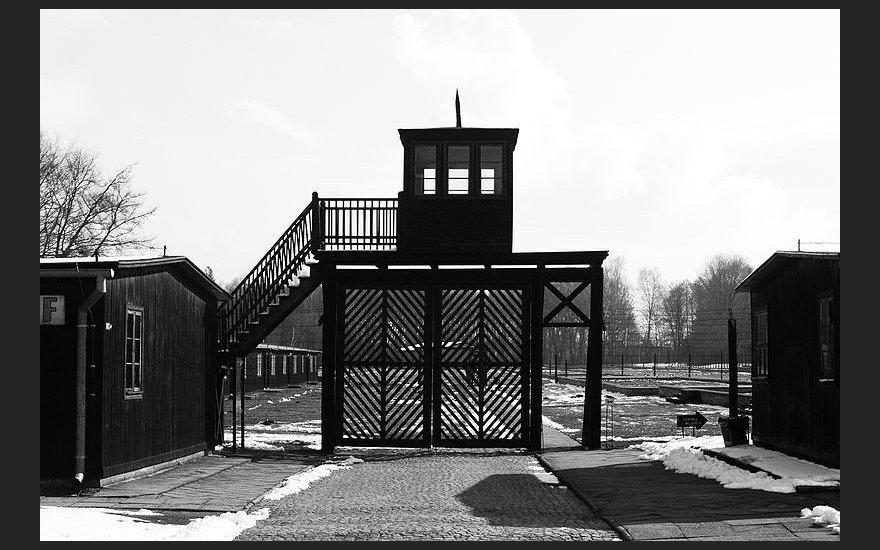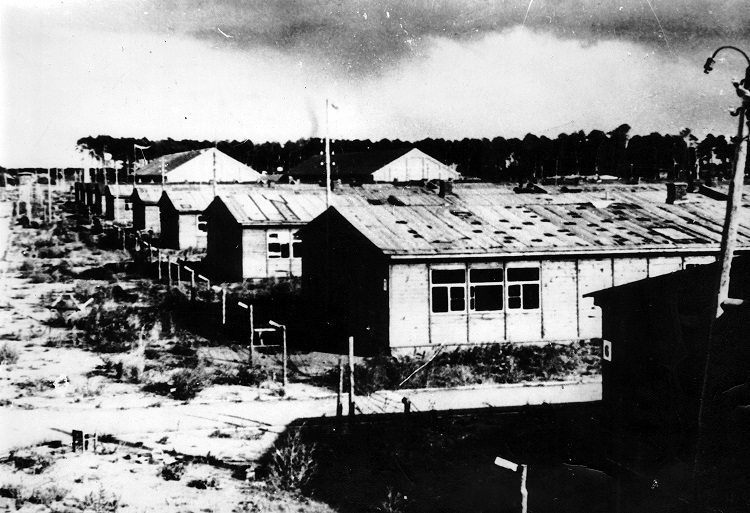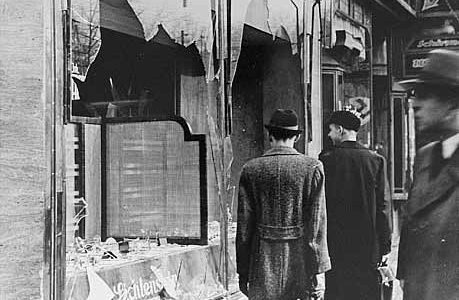Today marks 80 years since Kristallnacht, the Night of Broken Glass when Nazis in Germany, Austria and the Sudetenland went on an organized rampage murdering Jews and looting, burning and destroying Jewish businesses and synagogues. The pogrom of unprecedented scale was supposed to leave shattered glass in streets around the Third Reich, like crystals, and the staged event even had an official name, Reichskristallnacht. For many Jews and Germans it marked the beginning of the Holocaust, with hundreds murdered, thousands wounded and many women raped by the brownshirts. In leadership circles the Nazis actually called it the Week of Broken Glass. Nazi propaganda minister Josef Goebbels issued an order on the evening of November 9, 1938, calling for “spontaneous demonstrations” to be “organized and executed” that night. Reinhard Heydrich, second in command in the SS after Himmler, was in charge of operations at the street level. The Nazis overplayed their hand and forced themselves into a corner: following Kristallnacht, insurance claims threatened to bankrupt a large number of German insurers, leading the Nazis to seek desperately for an early, financial Final Solution.
Nazi Germany’s “break-the-glass moment” led to the seizure of Jewish property and Jews who were sent to concentration camps. In just over two years the Holocaust began in Lithuania as well, where between 140,000 and 150,000 people were murdered in just three months.

The 80th anniversary of Kristallnacht also coincides with the trial begun in Germany November 6, 2018, of a 94-year-old former SS guard accused of complicity in mass murder at the Stutthof concentration camp. Many Litvaks were incarcerated and murdered at the camp located on a narrow spit in the Baltic Sea accessible from Danzig/Gdansk. The man, whose identity and face are being kept secret by the German authorities despite the “public” trial, is accused in the murder of over 100 Polish Jews in June of 1944 and “at least several hundred more” from August to December of 1944. The accused served as an SS concentration camp guard from the age of 18 to 20. He might turn out to be the last Nazi war criminal to stand trial.


German fastidiousness led the Nazis to document many of their crimes, and documents captured after the war allow for a rather clear picture of what took place during the Nazis’ Week of Broken Glass. American journalist and long-time correspondent from Berlin William Shirer’s book Rise and Fall of the Third Reich devotes several pages to the events of that week:
In the autumn of 1938 another turning point for Nazi Germany was reached. It took place during what was later called in party circles the “week of the Broken Glass.”
On November 7, a seventeen-year-old German Jewish refugee by the name of Herschel Grynszpan shot and mortally wounded the third secretary of the German Embassy in Paris, Ernst von Rath. The youth’s father had been among ten thousand Jews deported to Poland in boxcars shortly before, and it was to revenge this and the general persecution of Jews in Nazi Germany that he went to the German Embassy intending to kill the ambassador, Count Johannes von Welczeck. But the young third secretary was sent out to see what he wanted, and was shot. There irony in Rath’s death, because he had been shadowed by the Gestapo as a result of his anti-Nazi attitude; for one thing, he had never shared the anti-Semitic aberrations of the rulers of his country.
On the night of November 9-10, shortly after the party bosses, led by Hitler and Goering, had concluded the annual celebration of the Beer Hall Putsch in Munich, the worst pogrom that had yet taken place in the Third Reich occurred. According to Dr. Goebbels and the German press, which he controlled, it was a “spontaneous” demonstration of the German people in reaction to the news of the murder in Paris. But after the war, documents came to light which show how “spontaneous” it was. They are among the most illuminating–and gruesome–secret papers of the prewar Nazi era.
On the evening of November 9, according to a secret report made by the chief party judge, Major Walther Buch, Dr. Goebbels issued instructions that “spontaneous demonstrations” were to be “organized and executed” during the night. But the real organizer was Reinhard Heydrich, the sinister thirty-four-year-old Number Two man, after Himmler, in the S.S., who ran the Security Service (S.D.) and the Gestapo. His teletyped orders during the evening are among the captured German documents.
At 1:20 A.M. on November 10 he flashed an urgent teletype message to all headquarters and stations of the state police and the S.D. instructing them to get together with party and S.S. leaders “to discuss the organization of the demonstrations.”
a. Only such measures should be taken which do not involve danger to German life or property. (For instance synagogues are to be burned down only when there is no danger of fire to the surroudings.)
b. Business and private apartments of Jews may be destroyed but not looted… .
d… 2. The demonstrations which are going to take place should not be hindered by the police …
5. As many Jews, especially rich ones, are to be arrested as can be accommodated in the existing prisons … Upon their arrest, the appropriate concentration camps should be contacted immediately, in order to confine them in these camps as soon as possible.
It was a night of horror throughout Germany. Synagogues, Jewish homes and shops went up in flames and several Jews, men, women and children, were shot or otherwise slain while trying to escape burning to death. A preliminary confidential report was made by Heydrich to Goering the following day, November 11.
The extent of the destruction of Jewish shops and houses cannot yet be verified by figures … 815 shops were destroyed, 171 dwelling houses set on fire or destroyed only indicate a fraction of the actual damage so far as arson is concerned … 119 synagogues were set on fire, and another 76 completely destroyed … 20,000 Jews were arrested. 36 deaths were reported and those seriously injured were also numbers at 36. Those killed and injured are Jews… .
The ultimate number of murders of Jews that night is believed to have been several times the preliminary figure. Heydrich himself a day after his preliminary report gave the number of Jewish shops looted at 7,500. There were also some cases of rape, which Major Buch’s party court, judging by its own report, considered worse than murder, since they violated the Nuremberg racial laws which forbade sexual intercourse between Gentiles and JEws. Such offenders were expelled from the part and turned over to the civil courts. Party members who simply murdered Jews “cannot be punished,” Major Buch argued, since they had merely carried out orders. On that point he was quite blunt. “The public, down to the last man,” he wrote, “realized that political drives like those of November 9 were organized and directed by the party, whether this is admitted or not.”
Murder and arson and pillage were not the only tribulations suffered by innocent German Jews as the result of the murder of Rath in Paris. The Jews had to pay for the destruction of their own property. Insurance monies due them were confiscated by the State. Moreover, they were subjected, collectively, to a fine of one billion marks as punishment, as Goering put it, “for their abominable crimes, etc.” These additional penalties were assessed at a grotesque meeting of a dozen German cabinet ministers and ranking officials presided over by the corpulent Field Marshal on November 12, a partial stenographic record of which survives.
A number of German insurance firms faced bankruptcy if they were to make good the policies on gutted buildings (most of which, thought hey harbored Jewish shops, were owned by Gentiles) and damaged goods. The destruction in broken window glass alone came to five million marks ($1,250,000) as a Herr Hilgard, who had been called in to speak for the insurance companies, remined Goering; and most of the glass replacements would have to be imported from abroad in foreign exchange, of which Germany was very short.
“This cannot continue!” exclaimed Goering, who, among other things, was the czar of the German economy. “We won’t be able to last, with all this. Impossible!” And turning to Heydrich, he shouted, “I wish you had killed two hundred Jews instead of destroying so many valuables!” “Thirty-five were killed,” Heydrich answered, in self-defense. Not all the conversation, of which the partial stenographic record runs to ten thousand words, was so deadly serious. Goering and Goebbels had a lot of fun arguing about subjecting the Jews to further indignities. The Propaganda Minister said the Jews would be made to clean up and level off the debris of the synagogues; the sites would be turned into parking lots. He insisted that the Jews be excluded from everything: schools, theaters, movies, resorts, public beaches, parks, even from the German forests. He proposed that there be special railway coaches and compartments for the Jews, but that they be made available only after all Aryans were seated.
“Well, if the train is overcrowded,” Goering laughed, “we’ll kick the Jew out and make him sit all alone all the way in the toiled.”
When Goebbles, in all seriousness, demanded that the Jews be forbidden to enter the forests, Goering replied, “We shall give the Jews a certain part of the forest and see to it that various animals that look damned much like Jews–the elk has a crooked nose like theirs–get there also and become acclimated.”
In such talk, and much more like it, did the leaders of the Third Reich while away the time in the crucial year of 1938.
But the question of who was to pay for the 25 million marks’ worth of damage caused by a pogrom instigated and organized by the State was a fairly serious one, especially to Goering, who now had become responsible for the economic well-being of Nazi Germany. Hilgard, on behalf of the insurance companies, pointed out that if their policies were not honored to the Jews, the confidence of the people, both at home and abroad, in German insurance would be forfeited. On the other hand, he did not see how many of the smaller companies could pay up without going broke.
This problem was quickly solved by Goering. The insurance companies would pay the Jews in full, but the sums would be confiscated by the State and the insurers reimbursed for a part of their losses. This did not satisfy Herr Hilgard, who, judging by the record of the meeting, must have felt that he had fallen in with a bunch of lunatics.
GOERING: The Jew shall get the refund from the insurance company but the refund will be confiscated. There will remain some profit for the insurance companies, since they won’t have to make good for all the damage. Herr Hilgard, you may consider yourself damned lucky.
HILGARD: I have no reason to. The fact that we won’t have to pay for all the damage, you call a profit!
The Field Marshal was not accustomed to such talk and he quickly squelched the bewildered businessman.
GOERING: Just a moment! If you are legally bound to pay five millions and all of a sudden an angel in my somewhat corpulent shape appears before you and tells you that you may keep one million, for heaven’s sake isn’t that a profit? I should like to go fifty-fifty with you, or whatever you call it. I have only to look at you. Your whole body seethes with satisfaction. You are getting a big rake-off!
The insurance executive was slow to see the point.
HILGARD: All the insurance companies are the losers. That is so, and remains so. Nobody can tell me differently.
GOERING: Then why don’t you take care of it that a few windows less are being smashed?
The Field Marshal had had enough of this commercial-minded man. Herr Hilgard was dismissed, disappearing into the limbo of history.
A representative of the Foreign Office dared to suggest that American public opinion be considered in taking further measures against the Jews. This inspired an outburst from Goering: “That country of scoundrels! … That gangster state!”
After further lengthy discussion it was agreed to solve the Jewish question in the following manner: eliminate the Jews from the German economy; transfer all Jewish business enterprises and property, including jewelry and works of art, to Aryan hands with some compensation in bonds from which the Jews could use the interest but not the capital. The matter of excluding Jews from schools, resorts, parks, forests, etc., and of either expelling them after they had been deprived of all their property or confining them to German ghettos where they would be impressed as forced labor, was left for further consideration by a committee.
As Heydrich put it toward the close of the meeting: “In spite of the elimination of the Jews from economic life, the main problem remains, namely, to kick the Jews out of Germany.” Count Schwerin von Krosigk, the Minister of Finance, the former Rhodes scholar who prided himself on representing the “traditional and decent Germany” in the Nazi government, agreed “that we will have to do everything to shove the Jews into foreign countries.” As for the ghettos, this German nobleman said meekly, “I don’t imagine the prospect of the ghetto is very nice. The idea of the ghetto is not a very agreeable one.”
At 2:30 P.M.–after nearly four hours–Goering brought the meeting to a close.
I shall close the meeting with these words: German Jewry shall, as punishment for their abominable crimes, et cetera, have to make a contribution of one billion marks. That will work. The swine won’t commit another murder. Incidentally, I would like to say that I would not like to be a Jew in Germany.
Much worse was to be inflicted on the Jews by this man and this State and its Fuehrer in the course of time, and a brief time it turned out to be. On the flaming, riotous night of November 9, 1938, the Third Reich had deliberately turned down a dark and savage road from which there was to be no return. A good many Jews had been murdered and tortured and robbed before, but these crimes, except for those which took place in the concentration camps, had been committed mostly by brown-shirted rowdies acting out of their own sadism and greed while the State authorities looked on, or looked the other way. Now the German government itself had organized and carried out a vast pogrom. The killings, the looting, the burning of synagogues and houses and shops on the night of November 9 were its doing. So were the official decrees, duly published in the official gazette, the Reichsgesetzblatt–three of them on the day of Goering’s meeting–which fined the Jewish community a billion marks, eliminated them from the economy, robbed them of what was left of their property and drove them toward the ghetto–and worse.
William Shirer, Rise and Fall of the Third Reich, New York 1960, pps. 385-389


